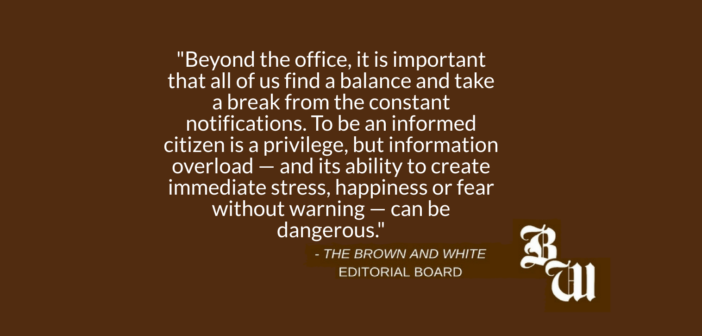It’s the ominous beep of the all-too-familiar alarm that is hastily snoozed in a panic. Then, it’s the tap of sorting through notifications that flood home screens.
CNN reports updates on impeachment. Twitter, the app that never sleeps, buzzes with the memes and breaking news from the night in 280 words or less. Five Instagram likes later, it’s time to get up for class and finally start the day.
The ruffle of the covers leaves a final sense of longing for more rest as feet hit the ground. The day has begun.
Students hurry to get ready for class, but notifications and information have already rushed to set the agenda for the day. Student have stressed over articles, laughed at memes or been confused by the weather, all before they walk out the door.
Every minute, Snapchat users share over 500,000 photos, more than 450,000 tweets are sent out and Instagram is filled with 46,000 photos.
The majority of students will consume some sort of media within the first hour of their days. Music plays over chirping birds, the news reveals the days’ concerns amidst breakfast at Williams Hall, and a scroll through Twitter becomes more common than a stroll through campus.
Our generation has access to more information than ever before, and the over consumption of information is a cause of concern.
A study by a UK software company found a third of people have experienced increases in stress as a result of increasing digital information that “we are expected to consume, make sense of and act on in our daily lives.”
As the line between the digital world and reality fades, we must reprioritize our own agendas. It’s time that we reconsider what we are “expected” to consume.
Whether the school day ends at noon or 7 p.m., the fast-paced nature of the digital age persists. Emails flash on screens as the 8 o’clock news plays in the background.
Students gruel over work in the library until 2 a.m., taking regular breaks to consume more information as they scroll through Twitter and receive text messages.
As this editorial continues, it is important that we recognize its irony. As a news outlet, The Brown and White competes in the race for information. Research and access to information are critical to write our editorials as we determine which information is relevant to craft this piece.
But even as journalists, it can be difficult to differentiate between necessary information and information that simply takes up space. But at the end of a work day, journalists are just people, too.
Beyond the office, it is important that all of us find a balance and take a break from the constant notifications. To be an informed citizen is a privilege, but information overload — and its ability to create immediate stress, happiness or fear without warning — can be dangerous.
One piece of information can reset the brain’s agenda. After just one click our brains crave more, even if we’ve already consumed the necessary amount of material.
The intake of information releases dopamine — the same chemical that is released when eating, drinking and socializing.
With this in mind, it is truly no surprise that when given the chance, we will pursue that information rush. But just like all things in life, moderation is key.
The addictive tendency to seek out information can drive us through the day, but often leaves us feeling rushed and overwhelmed by the end.
Just as there is power in information, there is power in rest. And as information inevitably becomes more accessible, we have the opportunity to set our own agendas and take time to reflect.
Sometimes, the best choice is quiet and the most valuable information is the lack of it. If we can begin to view the routine nature of information consumption, we can begin to define what is truly important.
We will likely find that a meal without text interruptions, and a bedtime routine without blue-light are just as important as the next headline.
As our heads hit the pillows, we can prepare for the next day knowing that we monitored our information for the day. Because, no matter what, we can anticipate that the headlines will be there in the morning. They aren’t going anywhere.






Comment policy
Comments posted to The Brown and White website are reviewed by a moderator before being approved. Incendiary speech or harassing language, including comments targeted at individuals, may be deemed unacceptable and not published. Spam and other soliciting will also be declined.
The Brown and White also reserves the right to not publish entirely anonymous comments.